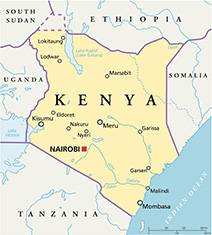Impact Evaluation of Plantwise, Kenya - CABI
 Smallholder farmers rely on crops for income and food security. However, their ability to generate income and maintain food security is threatened by the presence of pests and diseases and correspondingly a general lack of knowledge and information to address these issues. It has been estimated that 40 percent of crops worldwide are lost to pests, threatening local, national, and global food security. It is therefore important for developing countries to strengthen their agricultural extension services as an engine for improving productivity, reaching marginalized, poor, and female farmers, and addressing new challenges, such as environmental degradation and climate change. However, structuring effective and viable extension systems remains a major challenge in most places.
Smallholder farmers rely on crops for income and food security. However, their ability to generate income and maintain food security is threatened by the presence of pests and diseases and correspondingly a general lack of knowledge and information to address these issues. It has been estimated that 40 percent of crops worldwide are lost to pests, threatening local, national, and global food security. It is therefore important for developing countries to strengthen their agricultural extension services as an engine for improving productivity, reaching marginalized, poor, and female farmers, and addressing new challenges, such as environmental degradation and climate change. However, structuring effective and viable extension systems remains a major challenge in most places.
AIR conducted an evaluation of the Plantwise extension program in Kenya, an initiative that supports and increases collaboration among actors in the national plant health system, establishes and maintains a network of plant clinics – a physical interface between farmers and crop protection experts – to address the needs of small-holders, and collects key information in the process that can be used for informing policy and for monitoring and evaluation purposes. Plantwise began working in Kenya in 2010 to gather, organize, manage, and disseminate plant health information to smallholder farmers. More than 150 Plant clinics have been established to provide farmers with low-cost access to plant health information and diagnosis of plant health issues.
Evaluation Details
To assess the Plantwise program in Kenya, we conducted a process and impact evaluation from 2014 to 2018. To measure the impacts at the farm level, we designed a multi-site, longitudinal, randomized controlled trial of 2800 farmers in 13 counties in Kenya, relying on the plant clinic expansion plan that Plantwise implemented from 2014 to 2018. For the process evaluation, we collected data at the national and county levels to assess to assess fidelity of program implementation and whether Plantwise led to stronger institutions for managing the plant health system in Kenya.
We found that providing agricultural extension through plant clinics is innovative in the following ways: first, it requires that farmers go see extension agents, rather than vice versa, reducing costs to extension service delivery and ensuring those targeted are those needing assistance. Second, the focus is on plant health, particularly pests and diseases, and farmers are encouraged to bring affected samples of the crop. Third, the approach reduces costs of delivery per farmer, as service is demand-led by farmers who already recognize they have a problem meaning that staff does not waste time providing information to individuals that do not need it. Fourth, the social networks and data gathering act as a pest and disease monitoring system that could be incorporated into national plant protection systems as general surveillance. At the farm level, Plantwise contributed to improvements in the use of agricultural practices, the use of inputs, and maize productivity –a major staple crop.
Overall, the evaluation results provide strong evidence that Plantwise has altered in significant ways the agricultural extension system in Kenya in a way that are less costly than traditional extension services and provide a greater focus on farmer needs.
You can learn more about the evaluation of this program in this publication.

